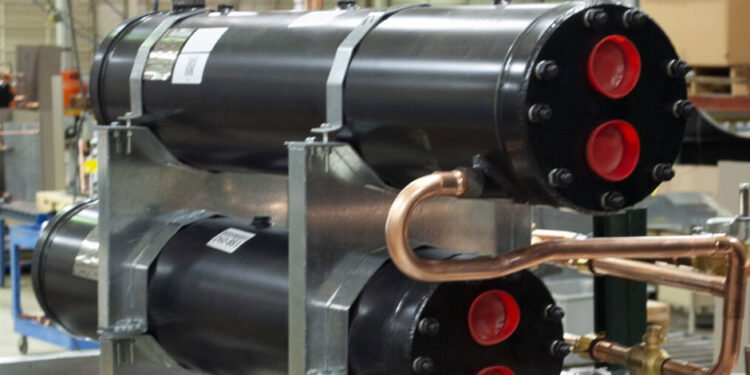In the manufacturing world, it’s often important to have cooling mechanisms that can remove heat from a given system and ensure optimal temperatures for other necessary operations. But there are many different types of products and systems capable of conducting this chilling effect.
One option available is a water cooled condenser. But how exactly do water cooled condensers work and what are the benefits of using them?
What Is a Water Cooled Condenser?
A water cooled condenser is a type of component often used in manufacturing to produce a cooling effect. As a chiller component, it removes heat generated by various commercial or industrial processes and can help ensure successful continued operations in systems that need to run at certain temperatures.
The water cooled condenser works through a series of four phases:
- Refrigerant entry. First, a substance known as refrigerant, which is heated up during the cooling cycle, is sent to the condenser in the form of hot, high-pressure gas. Refrigerant is a special material that allows condensers to do their jobs properly.
- Heat exchange. Once the refrigerant has entered the water cooled condenser, the hot vapor passes over tiny coils that are filled with water. The water, as the name of this device suggests, is responsible for the cooling action; it absorbs heat from the gaseous refrigerant, which is then cooled and condensed into a liquid.
- Heat dissipation. After the water absorbs the heat, it is passed out of the condenser and into a separate component known as a cooling tower or heat exchanger. There, the water releases the absorbed heat into the environment and reaches a stabilized temperature.
- The cooling cycle. Finally, the cooled refrigerant in its standard liquid form is put back into the system so the cooling process can continue. There, it will absorb heat from the environment, become a gas again, and the cycle will continue. During this phase, the water will either be cooled and recirculated into the system or replaced with new water.
Water vs. Air Cooled Condensers
If you know anything about condensers and industrial cooling, you may already be familiar with these phases of chilling. But what makes water cooled condensers unique is that they stand in stark contrast to air cooled and evaporative condensers.
Nearly all condensers, regardless of type, have a similar function: pulling heat out of certain systems so they can remain at an optimal temperature. But within this category, different types of condensers use different mechanisms of action. For example, air cooled condensers rely on ambient air to cool refrigerant, supplementing the effect with fans.
Where would you use a water cooled condenser instead of one of these other types?
Benefits of water cooled condensers include:
- Potential indoor installation. Because of how water condensers operate, they can be installed inside. This can be very convenient if you want all your operations indoors.
- Minimal size. Some manufacturers prefer water cooled condensers because they have a minimal physical footprint. They won’t take up much space in your manufacturing facility, especially compared to air cooled condensers.
- Quieter operation. Water cooled condensers are typically quieter than air cooled condensers. If you’re trying to minimize noise in your industrial facility, this is a significant advantage.
- Energy efficiency. Modern manufacturers often strive for energy efficiency, and for good reason. Water cooled condensers are one of the most energy efficient options you can get. They do use energy, but only a minimal amount for the cooling effects you need.
- Long reliability. Some manufacturers appreciate the extended reliability of water cooled condensers, though routine maintenance is always important.
- Relatively easy installation. It’s likely that you’ll have your water cooled condenser professionally installed, but even so, there’s an advantage in the relatively easy installation.
- Faster cooling. Compared to air cooled condensers, water cooled condensers are capable of chilling environments faster.
- Relatively low condensing temperature. Condensing temperature matters for some applications. Accordingly, some people choose water cooled condensers because they have a relatively low condensing temperature associated with them.
- No need for external power. There’s no need for external power sources, which can be advantageous in some situations.
- Lower overall costs. When you factor in all costs associated with condensers, including the initial cost of purchase and installation, as well as the ongoing costs of maintenance and operation, water cooled condensers are less expensive.
- Suitability for multiple applications. It’s also important to note that water cooled condensers can be used for a wide variety of applications.
Water cooled condensers may be exactly what you need to keep your industrial and manufacturing systems cool. There are many advantages associated with water cooled condensers, but they aren’t right for every application, so do your due diligence before making your final decision.












